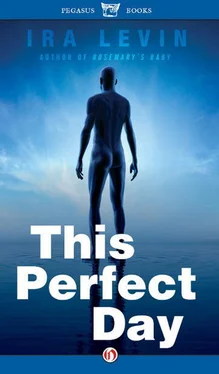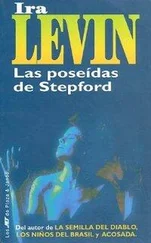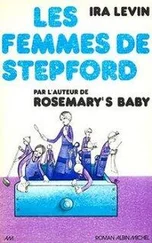“Yes,” Chip said.
“Of course!” Papa Jan said. “And if Uni gives out four names for boys it has to give out four names for girls too, right? Obviously! Listen.” He stopped Chip and, crouching down, spoke face to face with him, his bulging eyes dancing as if he was about to laugh. It was a holiday and they were on their way to the parade, Unification Day or Wei’s Birthday or whatever; Chip was seven. “Listen, Li RM35M26J449988WXYZ,” Papa Jan said. “Listen, I’m going to tell you something fantastic, incredible. In my day—are you listening?—in my day there were oyer twenty different names for boys alone! Would you believe it? Love of Family, it’s the truth. There was ‘Jan,’ and ‘John,’ and ‘Amu,’ and ‘Lev.’ ‘Higa’ and ‘Mike’! ‘Tonio’! And in my father’s time there were even more, maybe forty or fifty! Isn’t that ridiculous? All those different names when members themselves are exactly the same and interchangeable? Isn’t that the silliest thing you ever heard of?”
And Chip nodded, confused, feeling that Papa Jan meant the opposite, that somehow it wasn’t silly and ridiculous to have forty or fifty different names for boys alone.
“Look at them!” Papa Jan said, taking Chip’s hand and walking on with him—through Unity Park to the Wei’s Birthday parade. “Exactly the same! Isn’t it marvelous? Hair the same, eyes the same, skin the same, shape the same; boys, girls, all the same. Like peas in a pod. Isn’t it fine? Isn’t it top speed?”
Chip, flushing (not his green eye, not the same as anybody’s), said, “What does ‘peezinapod’ mean?”
“I don’t know,” Papa Jan said. “Things members used to eat before totalcakes. Sharya used to say it.”
He was a construction supervisor in EUR55131, twenty kilometers from ’55128, where Chip and his family lived. On Sundays and holidays he rode over and visited them. His wife, Sharya, had drowned in a sightseeing-boat disaster in 135, the same year Chip was born; he hadn’t remarried.
Chip’s other grandparents, his father’s mother and father, lived in MEX10405, and the only time he saw them was when they phoned on birthdays. They were odd, but not nearly as odd as Papa Jan.
School was pleasant and play was pleasant. The Pre-U Museum was pleasant although some of the exhibits were a bit scary—the “spears” and “guns,” for instance, and the “prison cell” with its striped-suited “convict” sitting on the cot and clutching his head in motionless month-after-month woe. Chip always looked at him—he would slip away from the rest of the class if he had to—and having looked, he always walked quickly away.
Ice cream and toys and comic books were pleasant too. Once when Chip put his bracelet and a toy’s sticker to a supply-center scanner, its indicator red-winked no and he had to put the toy, a construction set, in the turnback bin. He couldn’t understand why Uni had refused him; it was the right day and the toy was in the right category. “There must be a reason, dear,” the member behind him said. “You go call your adviser and find out.”
He did, and it turned out that the toy was only being withheld for a few days, not denied completely; he had been teasing a scanner somewhere, putting his bracelet to it again and again, and he was being taught not to. That winking red no was the first in his life for a claim that mattered to him, not just for starting into the wrong classroom or coming to the medicenter on the wrong day; it hurt him and saddened him.
Birthdays were pleasant, and Christmas and Marxmas and Unification Day and Wood’s and Wei’s Birthdays. Even more pleasant, because they came less frequently, were his linkdays. The new link would be shinier than the others, and would stay shiny for days and days and days; and then one day he would remember and look and there would be only old links, all of them the same and indistinguishable. Like peezinapod.
In the spring of 145, when Chip was ten, he and his parents and Peace were granted the trip to EUR00001 to see UniComp. It was over an hour’s ride from carport to carport and the longest trip Chip remembered making, although according to his parents he had flown from Mex to Eur when he was one and a half, and from EUR20140 to ’55128 a few months later. They made the UniComp trip on a Sunday in April, riding with a couple in their fifties (someone’s odd-looking grandparents, both of them lighter than normal, she with her hair unevenly clipped) and another family, the boy and girl of which were a year older than Chip and Peace. The other father drove the car from the EUR00001 turnoff to the carport near UniComp. Chip watched with interest as the man worked the car’s lever and buttons. It felt funny to be riding slowly on wheels again after shooting along on air.
They took snapshots outside UniComp’s white marble dome—whiter and more beautiful than it was in pictures or on TV, as the snow-tipped mountains beyond it were more stately, the Lake of Universal Brotherhood more blue and far-reaching—and then they joined the line at the entrance, touched the admission scanner, and went into the blue-white curving lobby. A smiling member in pale blue showed them toward the elevator line. They joined it, and Papa Jan came up to them, grinning with delight at their astonishment.
“What are you doing here?” Chip’s father asked as Papa Jan kissed Chip’s mother. They had told him they had been granted the trip and he had said nothing at all about claiming it himself.
Papa Jan kissed Chip’s father. “Oh, I just decided to surprise you, that’s all,” he said. “I wanted to tell my friend here”—he laid a large hand across Chip’s shoulder—“a little more about Uni than the earpiece will. Hello, Chip.” He bent and kissed Chip’s cheek, and Chip, surprised to be the reason for Papa Jan’s being there, kissed him in return and said, “Hello, Papa Jan.”
“Hello, Peace KD37T5002,” Papa Jan said gravely, and kissed Peace. She kissed him and said hello.
“When did you claim the trip?” Chip’s father asked.
“A few days after you did,” Papa Jan said, keeping his hand on Chip’s shoulder. The line moved up a few meters and they all moved with it.
Chip’s mother said, “But you were here only five or six years ago, weren’t you?”
“Uni knows who put it together,” Papa Jan said, smiling. “We get special favors.”
“That’s not so,” Chip’s father said. “No one gets special favors.”
“Well, here I am, anyway,” Papa Jan said, and turned his smile down toward Chip. “Right?”
“Right,” Chip said, and smiled back up at him.
Papa Jan had helped build UniComp when he was a young man. It had been his first assignment.
The elevator held about thirty members, and instead of music it had a man’s voice—“Good day, brothers and sisters; welcome to the site of UniComp”—a warm, friendly voice that Chip recognized from TV. “As you can tell, we’ve started to move,” it said, “and now we’re descending at a speed of twenty-two meters per second. It will take us just over three and a half minutes to reach Uni’s five-kilometer depth. This shaft down which we’re traveling…” The voice gave statistics about the size of UniComp’s housing and the thickness of its walls, and told of its safety from all natural and man-made disturbances. Chip had heard this information before, in school and on TV, but hearing it now, while entering that housing and passing through those walls, while on the very verge of seeing UniComp, made it seem new and exciting. He listened attentively, watching the speaker disc over the elevator door. Papa Jan’s hand still held his shoulder, as if to restrain him. “We’re slowing now,” the voice said. “Enjoy your visit, won’t you?”—and the elevator sank to a cushiony stop and the door divided and slid to both sides.
Читать дальше











